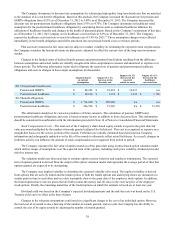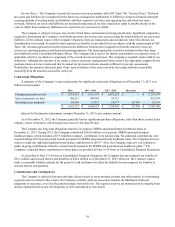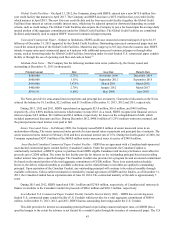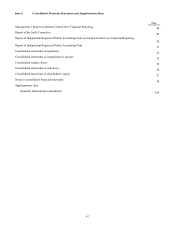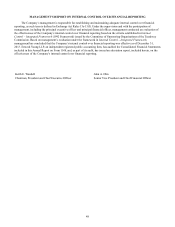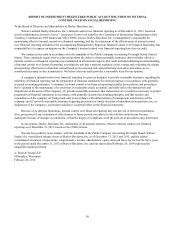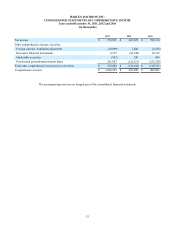Harley Davidson 2013 Annual Report Download - page 43
Download and view the complete annual report
Please find page 43 of the 2013 Harley Davidson annual report below. You can navigate through the pages in the report by either clicking on the pages listed below, or by using the keyword search tool below to find specific information within the annual report.
43
Global Credit Facilities – On April 13, 2012, the Company, along with HDFS, entered into a new $675.0 million five-
year credit facility that matures in April 2017. The Company and HDFS also have a $675.0 million four-year credit facility
which matures in April 2015. The new five-year credit facility and the four-year credit facility (together, the Global Credit
Facilities) bear interest at various variable interest rates, which may be adjusted upward or downward depending on certain
criteria, such as credit ratings. The Global Credit Facilities also require the Company to pay a fee based upon the average daily
unused portion of the aggregate commitments under the Global Credit Facilities. The Global Credit Facilities are committed
facilities and primarily used to support HDFS’ unsecured commercial paper program.
Unsecured Commercial Paper – Subject to limitations, HDFS could issue unsecured commercial paper of up to $1.35
billion as of December 31, 2013 supported by the Global Credit Facilities. Outstanding unsecured commercial paper may not
exceed the unused portion of the Global Credit Facilities. Maturities may range up to 365 days from the issuance date. HDFS
intends to repay unsecured commercial paper as it matures with additional unsecured commercial paper or through other
means, such as borrowing under the Global Credit Facilities, borrowing under its asset-backed U.S. commercial paper conduit
facility or through the use of operating cash flow and cash on hand.(1)
Medium-Term Notes – The Company has the following medium-term notes (collectively, the Notes) issued and
outstanding at December 31, 2013 (in thousands):
Principal Amount Rate Issue Date Maturity Date
$500,000 5.75% November 2009 December 2014
$600,000 1.15% September 2012 September 2015
$450,000 3.875% March 2011 March 2016
$400,000 2.70% January 2012 March 2017
$910,511 6.80% May 2008 June 2018
The Notes provide for semi-annual interest payments and principal due at maturity. Unamortized discounts on the Notes
reduced the balance by $1.5 million, $2.2 million, and $1.9 million at December 31, 2013, 2012 and 2011, respectively.
During 2013, 2012 and 2011, HDFS repurchased an aggregate $23.0 million, $16.6 million, and $49.9 million,
respectively, of its 6.80% medium-term notes which mature in June 2018. As a result, HDFS recognized in financial services
interest expense $4.9 million, $4.3 million and $9.6 million, respectively, for losses on the extinguishment of debt, which
included unamortized discounts and fees. During December 2012, $400.0 million of 5.25% medium-term notes matured, and
the principal and accrued interest were paid in full.
Senior Unsecured Notes – In February 2009, the Company issued $600.0 million of senior unsecured notes in an
underwritten offering. The senior unsecured notes provide for semi-annual interest payments and principal due at maturity. The
senior unsecured notes mature in February 2014 and have an annual interest rate of 15%. During the fourth quarter of 2010, the
Company repurchased $297.0 million of the $600.0 million senior unsecured notes at a price of $380.8 million.
Asset-Backed Canadian Commercial Paper Conduit Facility – HDFS has an agreement with a Canadian bank-sponsored
asset-backed commercial paper conduit facility (Canadian Conduit). Under the agreement, the Canadian Conduit is
contractually committed, at HDFS' option, to purchase from HDFS eligible Canadian retail motorcycle finance receivables for
proceeds up to C$200 million. The terms for this facility provide for interest on the outstanding principal based on prevailing
market interest rates plus a specified margin. The Canadian Conduit also provides for a program fee and an unused commitment
fee based on the unused portion of the total aggregate commitment of C$200 million. There is no amortization schedule;
however, the debt is reduced monthly as available collections on the related finance receivables are applied to outstanding
principal. Upon expiration of the Canadian Conduit, any outstanding principal will continue to be reduced monthly through
available collections. Unless earlier terminated or extended by mutual agreement of HDFS and the lenders, as of December 31,
2013, the Canadian Conduit has an expiration date of June 30, 2014. The contractual maturity of the debt is approximately 5
years.
During 2013 and 2012, HDFS transferred $101.1 million and $230.0 million, respectively, of Canadian retail motorcycle
finance receivables to the Canadian Conduit for proceeds of $88.6 million and $201.3 million, respectively.
Asset-Backed U.S. Commercial Paper Conduit Facility Variable Interest Entity (VIE) – HDFS has a revolving asset-
backed U.S. commercial paper conduit facility (U.S. Conduit) which provides for a total aggregate commitment of $600.0
million. At December 31, 2013, 2012, and 2011, HDFS had no outstanding borrowings under the U.S. Conduit.
This debt provides for interest on outstanding principal based on prevailing commercial paper rates, or LIBOR plus a
specified margin to the extent the advance is not funded by a conduit lender through the issuance of commercial paper. The U.S







